From the establishment of these fundamental patients’ rights, the European Charter of Patient’s Rights has been crucial as it has become a milestone and has inspired many other Charters of Rights in Europe! Here you can see some examples:
CHARTS PROMOTED OR CO-PROMOTED BY CITTADINANZATTIVA/ACTIVE CITIZENSHIP NETWORK 
Charter of Rights of the Cephalalgic Patient/Carta dei Diritti del Paziente Cefalalgico
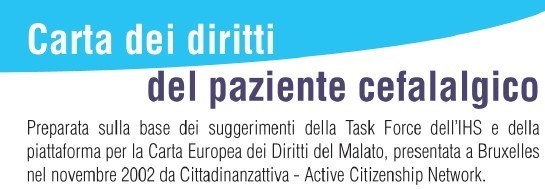
Promoted by AIC-onlus e OUCH-Italy, in collaboration with Cittadinanzattiva-Tribunal for
Patients’ Rights and with the participation and the sharing of LIC- Italian Cephalalgic League (Florence, 8 November 2003).
Headache indistinctly affects adults and children: the people who often, if not even every day, must deal with headache attacks are many. Headache affects a large part of the population and, often, it significantly affects the lives of those who suffer from it: about 10% of children aged 4 to 10 years old, without gender differences, and 14% of adults. Not only. Over 7% of Italians have lives devastated by migraines, which ranks fourth among the disabling neurological diseases. In 2% of the population, headache is chronic and is accompanied by other disorders, such as depression and anxiety (90% of the cases). The SISC has developed the Charter of Rights of the Cephalalgic Patient, a document made possible by the joint work of the International Headache Society and Cittadinanzattiva-Active Citizenship Network, which reports the specific instances of the cephalalgic subjects.
For the download click here.
Read more:
- Associazione Neurologica Italiana per la Ricerca sulle Cefalee (IT)
- Italian Migraine Project- Lettera di Intenti (IT)
- Manifesto dei Diritti della Persona con Cefalea (IT)
Charter of Rights against Unnecessary Pain/ Carta dei Diritti sul Dolore Inutile
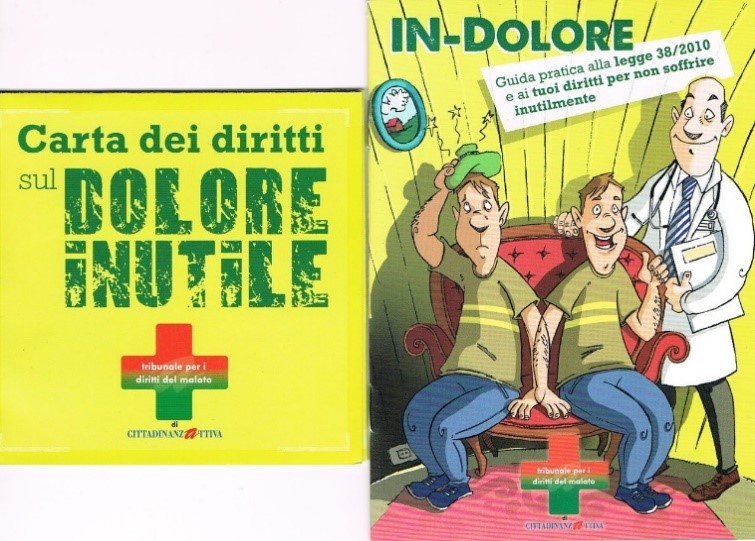
Promoted by Cittadinanzattiva- Tribunal for Patients’ Rights, collaborating with: Italian Association of Family Doctors (AIMEF), Italian Association of Medical Oncology (AIOM), National Association of Rheumatic Patients (ANMAR), Le Molinette Hospital of Turin (ANTEA onlus), Italian Federation of General
Practitioners (FIMMG), Italian Society of Anesthesia, Analgesia, Reanimation and Intensive Therapy (SIAARTI), Italian Society of Hospital Pharmacists (SIFO), Italian Society of General Medicine (SIMG), Italian Society of Orthopedics and Traumatology (SIOT ), Italian Society of Rheumatology (SIR) (2005).
The Charter was developed with the aim of declaring and protecting a group of eight rights, still too often violated. It was promoted in order to obtain fair and adequate treatments that pay attention to the suffering that is felt in every moment of the disease among the adults, the elderly, and the children. The eight rights that the Charter identifies are: right not to suffer unnecessarily, right to recognition of pain, right of access to pain therapy, right to qualified assistance, right to continuous assistance, right to a free and informed choice, right of the child, the elderly and the subjects who "have no voice", right not to feel pain during invasive and non-invasive diagnostic tests.
For the download click here.
Read more on the engagement of Cittadinanzattiva in the fight against unnecessary pain:
- Cittadinanzattiva (IT)
- Project IN-DOLORE 2014 in Italy of Cittadinanzattiva (IT)
- Report on respect of patients' rights in Europe of Cittadinanzattiva
- The Engagement of Cittadinanzattiva in the Fight against Useless Pain
The Italian Charter For Quality Assurance In Internal Medicine/ La Carta della Qualità in Medicina Interna
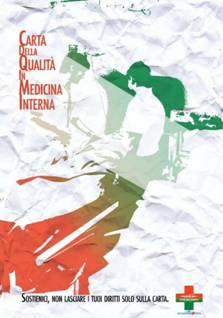
Promoted by an initiative of Antonino Mazzone, president of the Federation of Hospital Internship Associations (FADOI) and a collaboration between Cittadinanzattiva, National Association of Hospital Nurses (ANIMO) and FADOI (5 July 2010).
The Italian Charter for Quality Assurance in Internal Medicine is a response to the European Charter of Patients’ Rights presented in Brussels in 2002. It is the product of collaborative efforts by Cittadinanzattiva, the National Association of Hospital Nurses (ANIMO), and the Federation of Associations of Executive-Level Hospital Internists (FADOI). Its objectives are to enhance respect for patients’ rights and promote uniformity in the quality of care delivered in Italy’s health-care facilities, which is currently characterized by marked inter-regional and inter-hospital variability. This article describes the reasons and principles that have guided the Charter’s elaboration and the benefits of partnership between citizens and health-care providers.
For the download click here.
Read more:
Carta de los Derechos de los Pacientes/ The Charter of Patients’ Rights
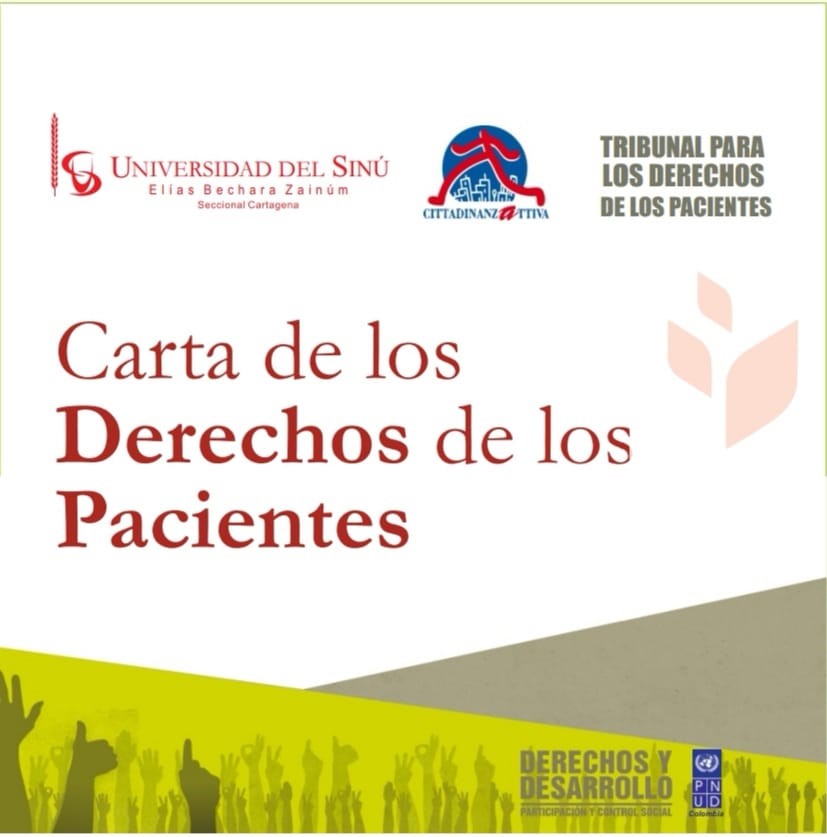
This Colombian Charter of Patients’ Rights was promoted by Cittadinanzattiva, the University of Sinù "Elias Bechara Zainum" and the Tribunal for Patients’ Rights in Cartagena de Indias. Citizen, patient and user organizations, ESE-Cartagena, IPS, EPS and the dependencies of the Cartagena City Hall (related to issues of citizen participation and health) contributed to the construction of the Charter (16 December 2011).
The Charter was built using four major sources:
- CIVIC SOURCE: complaints and reports of violations Colombian citizens addressed to the Tribunal for Patients’ Rights in Cartagena de Indias were collected;
- STATISTICAL SOURCE: the University of Sinù conducted an assessment of the state of health and patients’ rights to health in Cartagena
- LEGAL SOURCE: experiences and expertise of Cittadinanzattiva in drafting Charter of Rights, promoted in Italy and in Europe
- EXPERIENTIAL: establishment of a school composed of experts of the health system and of citizens and advocacy patient and user organizations.
This experience was a great example of patients’ empowerment, and of the power of civic participation, active citizenship and partnerships!
This Charter, following the model of the European Charter of Patients’ Rights, explains the 12 rights that a patient must have: right to respect of the person, right of access, right to information, right to free choice, right to timely care, right to relevant care, right to continuous care, right to safe care, right to privacy, right to the promotion of health and prevention of disease, right to claim, right to participation.
For the download click here.
Charter of the Quality of the Pharmacy/Carta della Qualità della Farmacia
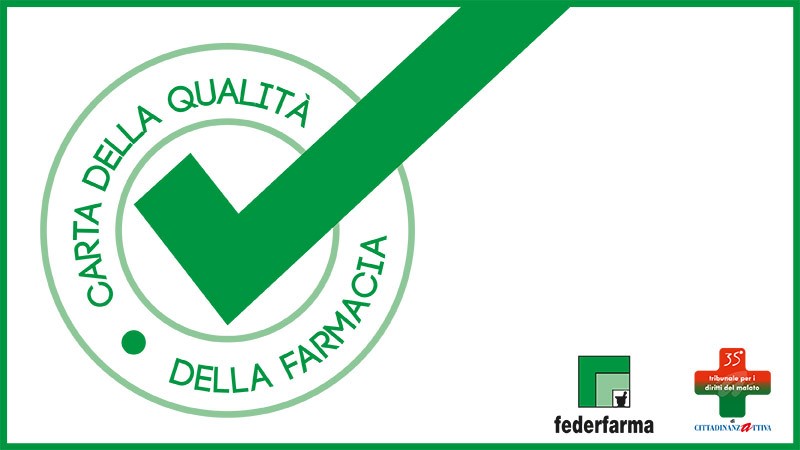
Promoted by Cittadinanzattiva-Tribunal for Patients’ Rights and Federfarma at the Ministry of Health, in the presence of the Ministry Beatrice Lorenzin (28 September 2015).
The Charter has the aim of renewing the commitment made by pharmacies to promote respect for citizens' rights, considering the news of the current healthcare landscape and of the social and economic context.
By adhering to the Charter, pharmacies undertake the commitment to respect and spread the principles contained in the European Charter of Patients’ Rights, to take into account at every stage of their activity the needs of people and the difficulties they may encounter in exercising their right to health.
The inspiring principles of the Charter are: accessibility, assistance and customization, information, safety and quality standards of the services provided. For each of these categories, the Charter lists the commitments that the pharmacy undertakes and the rights that must be guaranteed to the citizen.
For the download click here.
Read more:
Italian Urban Diabetes Charter
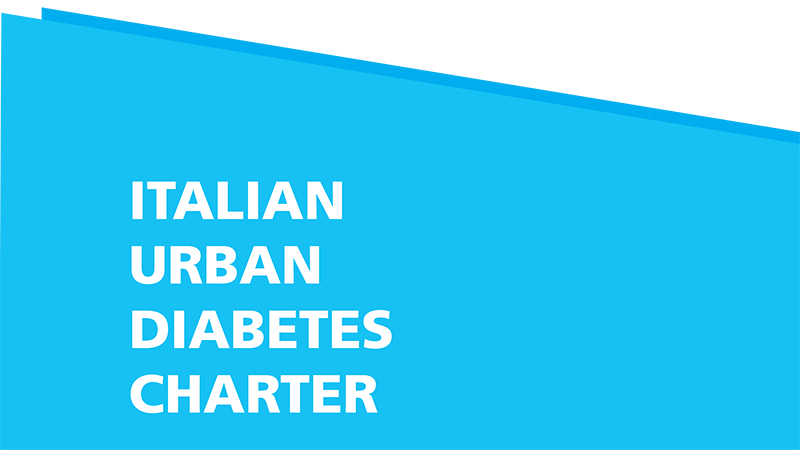
The document Italian Urban Diabetes Charter was signed in 2017 by Health City Institute, ANCI, Higher Institute of Health, AMD, SID, SIMG and Cittadinanzattiva. The Charter deals with the explosion of urban diabetes, which will bring 75% of the population with diabetes to reside in cities by 2040. The document aims to outline the key points that can guide local administrations, in consultation with health, scientific and academic institutions, in promoting strategies to improve information, the assistance network, prevention and treatment of people with type 2 diabetes, limiting the "social costs" due to complications and mortality. The Charter identifies and suggests ten points on which to concentrate the action of all those involved and interested in the important challenge for urban and health governance due to the pandemic evolution of Type 2 diabetes.
For the download click here.
Read more:
Charter of Rights and Duties of the Person with Obesity/Carta dei Diritti e dei Doveri di Persone Obese
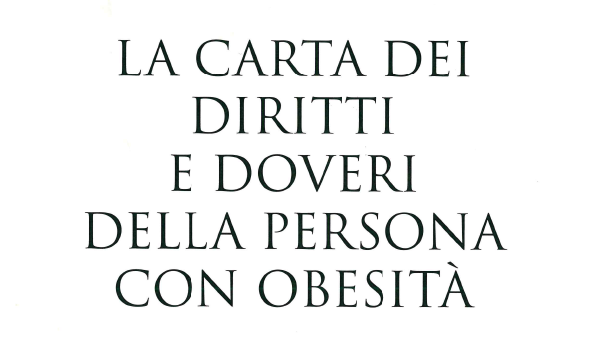
The Charter of Rights and Duties of the Person with Obesity was signed on 8 October 2019 by ADI (Italian Association of Dietetics and Clinical Nutrition), its Foundation and Io-Net (Italian Obesity Network), together with 12 other organizations, among which scientific societies, patient and citizen associations, foundations and research centers active in the fight against obesity in Italy: Cittadinanzattiva; Parliamentary Intergroup 'Obesity and diabetes' - Anci; Obese friends (Amici Obesi); Siedep; SIMG; Sicob; Sie; Ibdo Foundation; Forisie and Open Italia; Sio; Iwa.
All these associations agree on the need for urgent interventions to transform general principles into concrete rights and indicate the ways to follow in order to protect the people suffering from obesity. The Charter states and promotes 10 fundamental points to guarantee and protect those who live with serious weight problems. These rights refer to the ones of the European Charter of Patients’ Rights and regard: responsibilities, rights and duties, education, doctor-patient dialogue, management, prevention, research, responsible associations, young people and the fight against stigma.
For the download click here.
Read more:
Milan Charter on Urban Obesity 2020
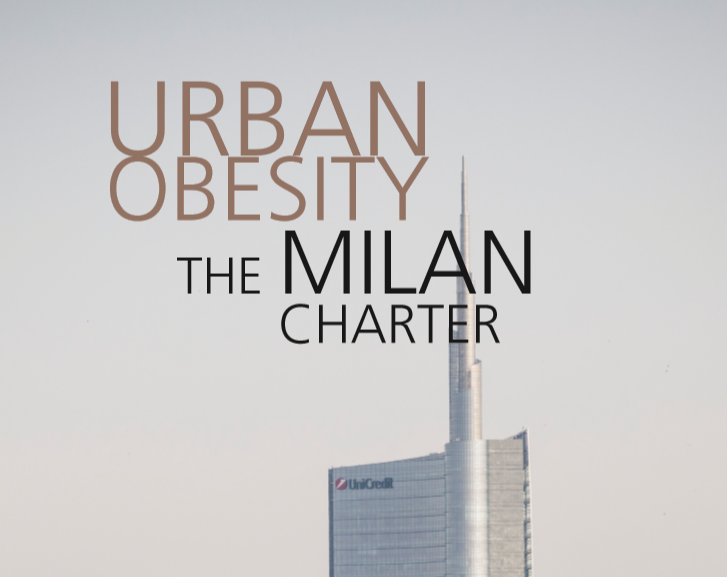
The 2020 Milan Charter on Urban Obesity has been promoted by Centre for the Study and Research on Obesity (CSRO) of the University of Milan, in cooperation with the Municipality of Milan, the Region of Lombardy, ANCI (National Association of Italian Municipalities), the Parliamentary Intergroup on Obesity and Diabetes, HCI (Health City Institute), CCD (Cities Changing Diabetes) network, IO-NET (Italian Obesity Network), OPEN (Obesity Policy Engagement Network), SIO (Italian Obesity Society), SIP (Italian Society of Pediatrics), SIEDP (Italian Society of Pediatric Endocrinology and Diabetology), ADI (Italian Association of Dietetics and Clinical Nutrition), IBDO Foundation (Italian Barometer Diabetes Observatory), SIMG (Italian Society of General Medicine and Primary Care), Amici Obesi Onlus (Friends of People Living with Obesity) and Cittadinanzattiva (2020).
Following on from the EASO Milan declaration in 1999 and the reiteration of these principles in the Milan Charter during Expo 2015, the Italian colleagues across various stakeholder groups, including leading clinicians, scientists, patient organizations, civic leaders, and policy leaders have developed a series of related initiatives, which recognized obesity as a chronic disease at the end of 2019. This Charter is an important and new public health initiative which aims at promoting urban sustainability and a greater understanding of the complexity of obesity and public-health improvement. This document lists the principles of healthy diets, sustainable development and environmental sustainability, whilst promoting human rights and facing the challenges linked to obesity and to its complex management in our contemporary world.
For the download click here.
Read more:
The Charter of Rights of Multiple Myeloma Patients/ Carta dei Diritti del Paziente con Mieloma Multiplo
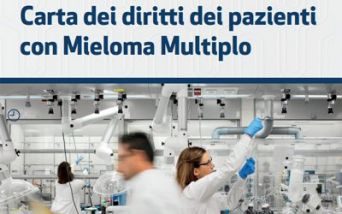
The Charter of the Rights of Multiple Myeloma Patients, promoted by Cittadinanzattiva with the unconditional contribution of GSK, was signed in December 2021. The objectives of the Charter are to respond to the numerous challenges patients have in their access to the planned prevention programs and services to detect risk factors early, access to diagnosis and treatment and connection with professional healthcare figures. In this context, the Charter aims to increase the level of information, awareness and participation in the process of treatment by patients with multiple myeloma and, at the same time, promote the harmonization of regional health systems to ensure equal rights to patients and their families everywhere.
The Charter was born from the experience of the European Charter of Patients' Rights, sanctioned by Cittadinanzattiva in 2002. Its rights and objectives refer to several of the European Charter’s rights, including: the right to prevention and timely treatment; the right to fair treatment; the right to personalized treatment and the right to receive the best therapeutic opportunity; the right to quality of care; the right to quality of life; the right to conscious information; the right to receive information on treatment choices; the right to be taken care of in all its complexity; the right to care for psychological aspects; the right not to suffer. For the download, click here.
Read more:
- Cittadinanzattiva: Charter of the Rights of Multiple Myeloma Patients (IT)
- Cittadinanzattiva (IT)
- Osservatorio malattie rare (IT)
CHARTS (NOT PROMOTED BY CITTADINANZATTIVA) THAT EXPLICITLY REFER TO THE CHARTER
European Charter of the Rights of Citizens over 65 with Chronic Pain/Carta Europea dei Diritti dei Cittadini Over 65 con Dolore Cronico
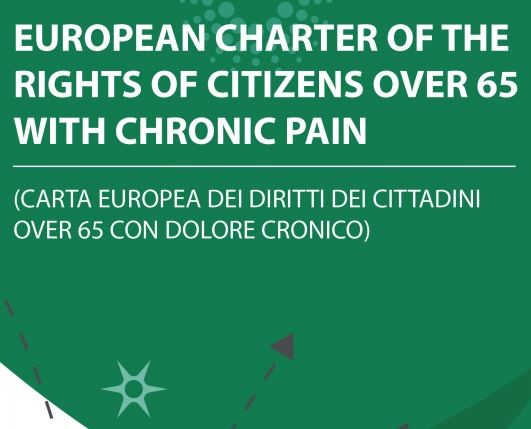
The following consensus document on the right to treatment was written by four non-profit organizations which represent the majority of older Europeans and/or those Europeans living with chronic pain: Federanziani, SIAH (Senior International Association for Health), Age Platform, Pain Alliance Europe. (December 2010).
By the writing of this Charter, their goal is to safeguard the rights of citizens over 65 years of age with chronic medical conditions. Chronic pain refers to pain “that extends beyond the usual course of an acute disease or beyond the expected time of healing”. Lasting over time, chronic pain can have serious adverse effects on psychological health and quality of life. Chronic pain as a disease is virtually unknown to health professionals and the public in general, although in fact chronic pain is associated with degenerative, neurological, and oncological diseases, especially in the advanced and terminal stages of the disease, and as such takes on the characteristics of global pain, linked to motivational, physical, psycho-logical, and social factors, as evidenced in the documents of the World Health Organization (WHO). According to WHO, chronic pain affects an important part of the world population, altering their physical, emotional and working capabilities, with a financial commitment probably similar to that advocated for neoplastic or cardiovascular functions.
For the download click here.
Read more:
Health Act - Patients’ Rights and Safety
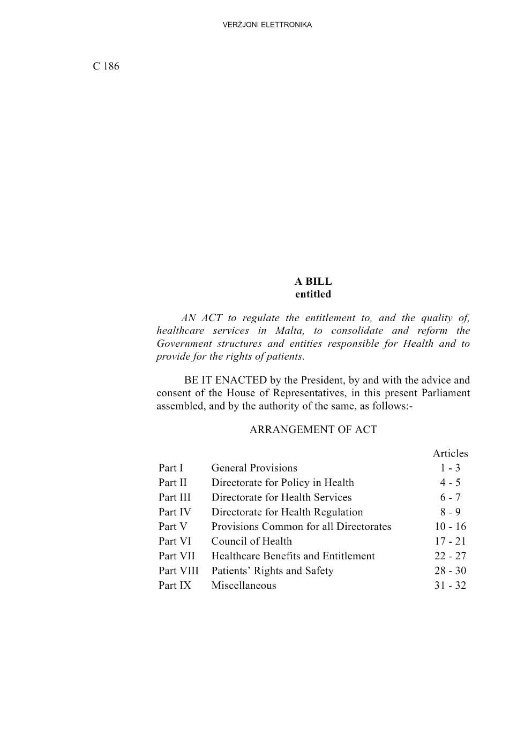
The Maltese government has widely recognized the rights included in the EU Charter and adopted them through the Health Act in Part VIII, which is that of Patients’ Rights and Safety (2013).
This Act was created to regulate the entitlement to, and the quality of, healthcare services in Malta, to consolidate and reform the Government structures and entities responsible for Health and to provide for the rights of patients. It was enacted by the President, by and with the advice and consent of the House of Representatives. Reference to the EU Charter of Patients’ Rights is made in Part VIII of the Health Act, which is that concerning Patients’ Rights and Safety.
For the download click here.
Read more:
European Charter on Adherence to Therapy
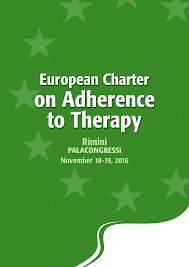
This Charter has been redacted during the 1st European Congress on Adherence to Therapy, under the patronage of the European Parliament and the Committee of the Regions. The Congress was held under the presidency of Giovanni La Via, Chair of the Committee on the Environment, Public Health and Food Safety-European Parliament and the honorary Presidency of Gianni Pittella, President of the Group of the Progressive Alliance of Socialists & Democrats in the European Parliament. (18-19 November 2016).
Given that the non-profit organization SIHA (Senior International Health Association) represents older Europeans and/or those Europeans living with chronic diseases and that its goal is to safeguard the rights of citizens over 65 years of age with chronic medical conditions, SIHA therefore undertake to prepare the following consensus document on Adherence to Therapy with the contribution of the main European scientific societies and of the organizations representing GPs, nurses, pharmacists, institutions, industry.
The "European Charter on Adherence to Therapy" summarizes the right to information, the right to preventive measures, the right to consent and the right to personalized treatment, making explicit that adherence to treatment is a right of the chronic patient. It argues that Europe and the Member States have a duty to attempt any possible solution to increase the level of adherence to treatment, in order to achieve important savings and improve the quality of life of citizens.
For the download click here.
CHARTS (NOT PROMOTED BY CITTADINANZATTIVA) THAT DO NOT EXPLICITLY REFER TO THE CHARTER AND THAT ARE PROMOTED BY INSTITUTIONAL SUBJECTS
Patients’ Charter for eHealth Information Systems
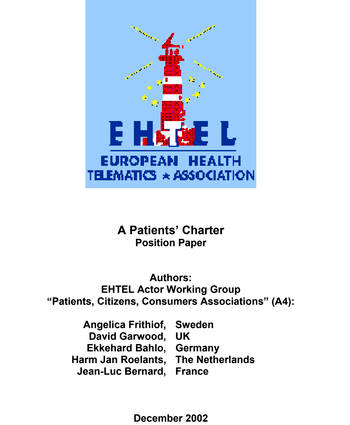
This Patient’s Charter was promoted by the European Health Telematics Association (EHTEL) in December 2002.
The Charter sets out the potential of e-health to improve healthcare, particularly for older people and those suffering chronic conditions, respecting, however, patients’ privacy at all times. The e-health Patients Charter aims to ensure patients’ voices are not overlooked in the development of e-healthy services. On this, the charter calls on national healthcare authorities across the European Union to adopt a patient-centric approach to agreeing and harmonizing guidelines on the use of e-health systems and the processing of electronic health records (EHRs).
The rights established under this charter take particular account of the increasing use of information technology in health care. Main areas covered include: ensuring patient dignity and respect, patients’ empowerment, privacy and confidentiality, and access to appropriate information. The rights shall be deemed to apply to every patient treated in a hospital, outpatient facility, ambulance, doctor’s office, nursing home or any other institution where health care services are provided. To download, click here.
Read more:
European Charter of the Family Member that Takes Care of a Not Self-Sufficient Family Member/Carta Europea del Familiare che si Prende Cura di un Familiare Non Autosufficiente
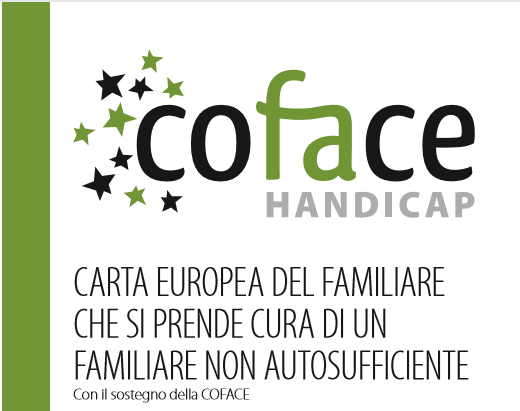
Promoted by Coface handicap (Confédération des organisations familiales de la Communauté européenne), Aias Nazionale and Ufha (Union of handicapped families), the Charter aims to support the person who takes care of a not self-sufficient family member (2007). The Charter, drawn up by the organizations in line with the objectives of the European Commission, was conceived as a useful and agile tool, divided into the following 10 points: definition of the family member who cares for a not self-sufficient family member; choice of the family member; family solidarity; national solidarity; position of the person who takes care of the not self-sufficient family member in social and health systems; official status of the family member who takes care of the not self-sufficient family member; life quality; right to relief intervention; information and training; evaluation. Besides disability, this Charter meets the needs of caring family members regardless of the cause of the dependency of the person being helped (age, illness, accident, etc.). The Charter allows you to contribute to the reconciliation of family and professional life thanks to a conscious choice of the family member who takes care of his/her own loved one who is not self-sufficient. The Charter is in accordance with the objectives of the 2000 Lisbon strategy. Furthermore, it intends to encourage the maintenance of the employment and the possible reintegration or resumption of work, the possibility of career progression for working family members, together with a better quality of life for the non-self-sufficient family member.
For the download click here.
Read more:
European Charter of Rights and Responsibilities of Older People in Need of Long-Term Care and Assistance
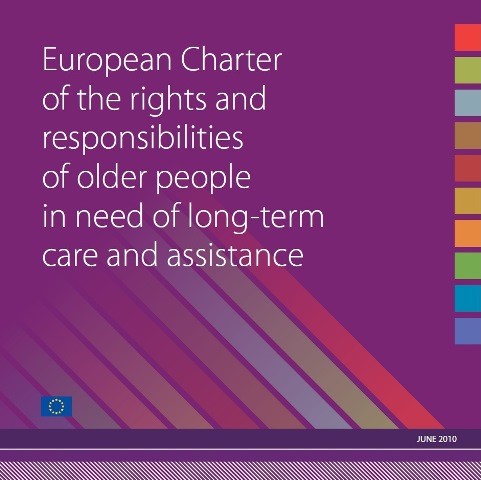
As part of the DAPHNE Eustacea project of the European Commission’s Daphne III Programme, AGE developed with a network of 11 partner organizations this European Charter and its Accompanying Guide aimed to prevent elder abuse and raise awareness of the rights of the increasing number of people receiving long-term care. The partners of the project were based in Netherlands (ANBO), Germany (BIVA), France (FNG), in Italy (FIPAC), Greece (Hellas 50+), Slovenia (Mestna zveva upokojencev Ljubljana), United Kingdom (NIACE), Sweden (SPF), Czech Republic (Zivot 90) and Belgium (Commune de Saint-Josse), and the European Association for Directors of Residential Homes for the Elderly (E.D.E) (June 2010).
This Charter focuses on the rights of older people who are dependent on a family member or carer, and that need long-term care or assistance. It aims to become a reference document setting out the fundamental principles and rights that are needed for the wellbeing of all those who are dependent on others for support and care due to age, illness or disability. Drawing on successful and innovative initiatives from across the EU, the accompanying guide addresses the following questions: What is elder abuse? How can it be spotted? Why does it happen and how can it be prevented? And when it does happen, how should it be treated? It also proposed recommendations - through consultation that involved older people themselves - for European, national and local authorities, service providers, older people’s organizations and potential victims.
For the download click here.
Read more:
European Idiopathic Pulmonary Fibrosis (IPF) Patient Charter

The European IPF Patient Charter is supported by IPF health care experts and patient organizations, along with industry, united in an unprecedented European-wide call to action to address this under-recognized fatal chronic disease and to ensure consistent and fair access to quality care across European countries (11 April 2016).
The European IPF Patient Charter calls for greater awareness of IPF and for better access to care in European countries. The Charter lays down recommendations that, if adopted, would ensure improvements in IPF patients’ quality of life, whilst supporting efforts to find a cure. It shows how, currently, between 80,000 and 111,000 people are living with Idiopathic Pulmonary Fibrosis in Europe. This fatal condition has been around for decades, yet there is no cure and only limited treatment available. IPF often develops rapidly and many patients are given a survival time of just two to five years. Each year around 35,000 people in Europe are newly diagnosed with IPF, with this number likely to increase in the future. The European IPF Patient Charter emphasizes the rights to: early and accurate diagnosis, equal access to care, a holistic approach to standardize IPF management, comprehensive and high quality information about the condition, and better access to palliative care and end-of-life care.
For the download click here.
Read more:
Charter of Patient’s Rights and Responsibilities
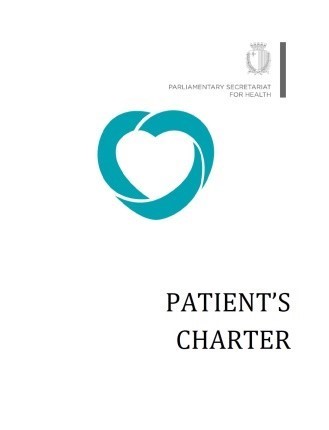
Promoted by Malta’s Ministry of Health and the Parliamentary Secretariat for Health (21 November 2016).
This Patient Charter, the first of its kind in Malta, claims that health and healthcare are a priority for each patient. Prevention of ill health as well as timely and appropriate care when the patient needs it are essential rights. The Charter addresses the way the health care service is provided, the level of quality expected and the time by when care should be provided in relation to the acuity of a patient’s condition. It is structured around eight principles that form the foundation for a safe healthcare service delivery: health protection, access, information, participation and informed consent, privacy and confidentiality, dignity and respect, safe healthcare, and comments and complaints. The Charter highlights the level of service one would expect when utilizing public health services. It aims to facilitate the relationship between service users and service providers and to provide a means to allow the service to work effectively and to make sure that the resources are used efficiently.
For the download click here.
Read more:
Charte de Bientraitance
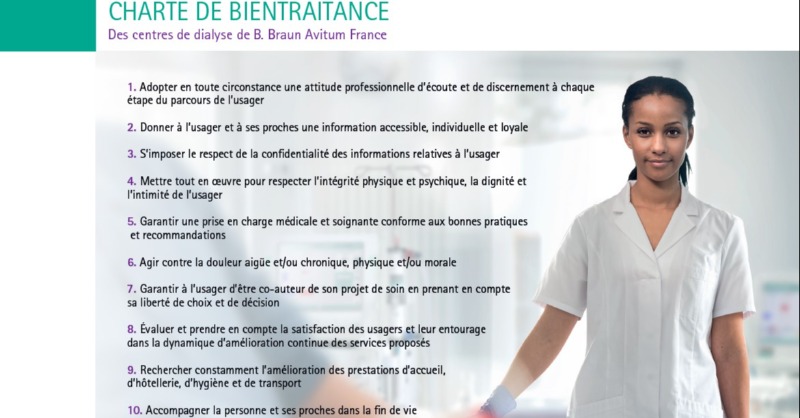
B. Braun Avitum France has drafted the “Charte de Bientraitance”, meaning “Charter of Good Treatment”, to guarantee the well-being of patients in healthcare centers.
The document expresses the strong professional values around the concept of good treatment to which the professionals must adhere. It encourages everyone to undertake to guarantee the best quality of care for patients, while respecting their decisions and freedom of choice in their treatment process. The Charter, besides the medical aspect of the patient, emphasizes also the psychological one. Thus, the nursing staff must also be committed to providing support and listening to the patient, while respecting his physical and psychological integrity as well as his dignity.
For the download, click here.
Read more:
CHARTS (NOT PROMOTED BY CITTADINANZATTIVA) THAT DO NOT EXPLICITLY REFER TO THE CHARTER AND THAT ARE PROMOTED BY NON-INSTITUTIONAL SUBJECTS
Albanian Charter of Patient' Rights

The Charter was approved by the Minister of Health (2010).
"Together for Life" in framework of the project “Strengthening democracy in healthcare by respecting human rights”, supported by Embassy of the Netherlands in Albania, prepared a video in which 16 celebrities show support in the implementation of the Albanian Charter of Patient’ Rights, by quoting the 16 articles of the document.
Read more:
A Catalyst for Change: The European Cancer Patient's Bill of Rights
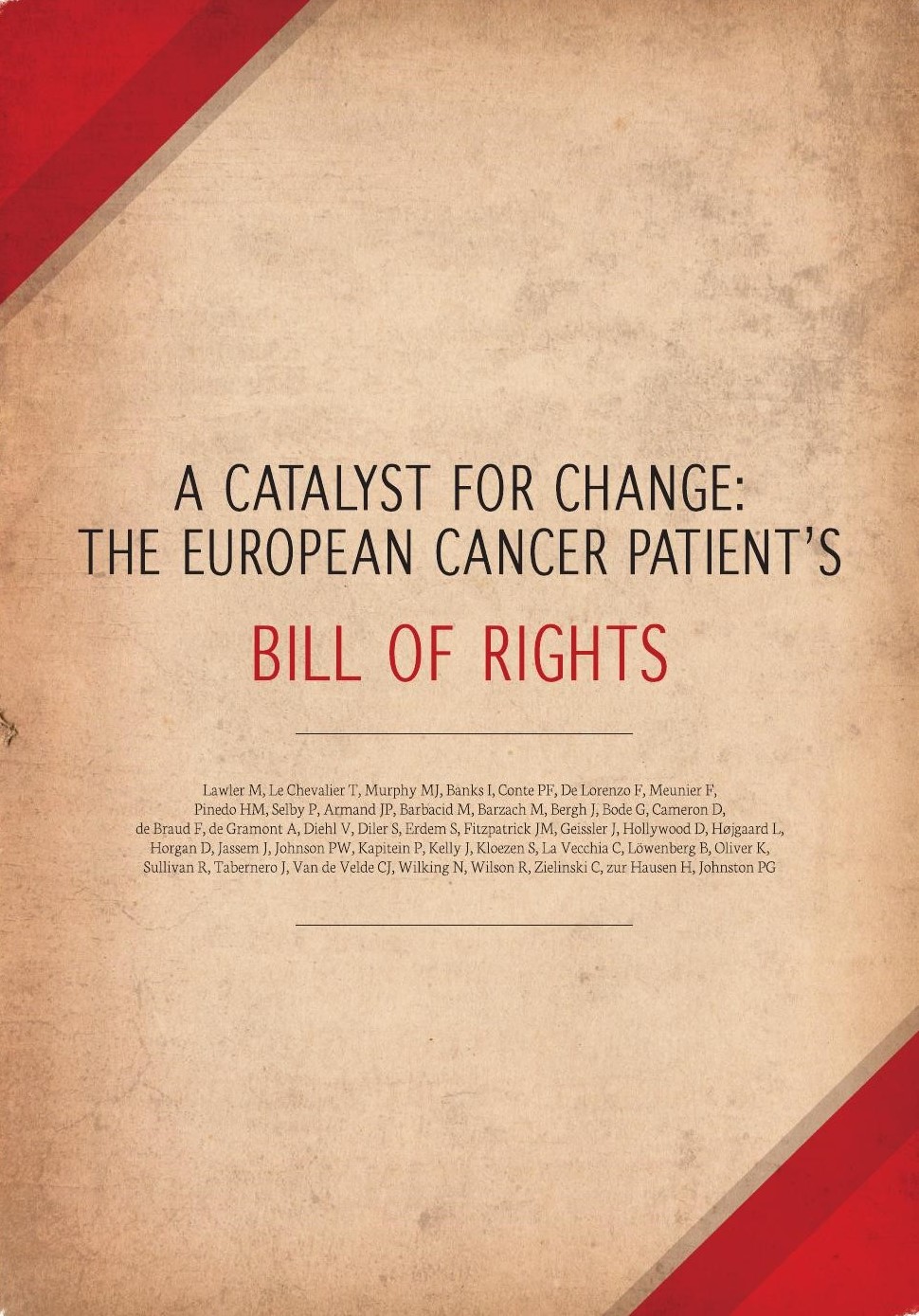
This Bill of Rights was published on The Oncologist in 2014.
The European Cancer Patient’s Bill of Rights is a patient Charter that provides benefits for European cancer patients and that underpins equitable access to an optimal standard of care for Europe’s citizens. Cancer and the provision of cancer care places a significant and growing burden on patients, citizens, and economies. Europe provides some of the best cancer care in the world and conducts high-quality, globally recognized cancer research. There are still significant disparities, however, in public information about cancer, accessing cancer care, delivering optimal treatment, supporting cancer survivorship, and integrating cancer research and innovation across European countries. In addition, costs of current treatments and long-term follow-up are placing significant economic burdens on European health care systems. Therefore, this Charter, following the principles of the European Charter of Patients’ Rights, tries to improve and make the situation better on the topic of cancer patients.
For the download click here.
Read more:
The Global Stroke Bill of Rights
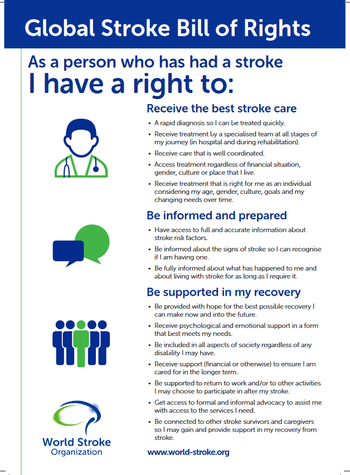
The Global Stroke Bill of Rights was drafted by the World Stroke Organization in October 2014.
The Global Stroke Bill of Rights is an important priority for the World Stroke Organization. Its rights identify the aspects of care that are important for all stroke survivors and caregivers from across the world and rest on three main principles: receive the best stroke care, be informed and prepared, and be supported in recovery. It is a tool that can be used by individuals and organizations to communicate with stroke care providers and with governments and their agencies about what people affected by stroke think are the most important things in their recovery. The Stroke Bill of Rights is not a legal document, rather it is a guide to the elements of stroke care that are important to stroke survivors and care givers to drive to the best possible outcomes and experiences associated with stroke. It was developed by a group of stroke survivors and caregivers from each region of the world.
For the download click here (EN) and here (IT).
Read more:












